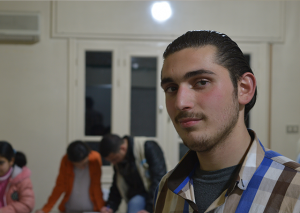敘利亞兒童有甚麼未來?
2015-03-12
安東尼.雷克 聯合國兒童基金會執行主任
這個月,無情的敘利亞危機踏入第5年。
這個令人震驚的歷史性時刻,標誌着暴力衝突及苦難已持續四年,而短期內不見得有結束的跡象。數以萬計平民被奪去性命,數以萬計人民流離失所。家園、醫院、學校都成為襲擊對象。不少社區被斷絕人道救援,缺水缺糧。暴力衝突更不斷擴大,蔓延至鄰近國家。試試由兒童的眼晴出發,想像他們在恐怖衝突的生活。他們的家被炮擊或淪為廢墟;他們失去所愛的人或朋友;他們的學習受到中斷,或根本從未試過上學;他們的童年就這樣被偷走。
這場危機是近代史上最惡劣的人道災難。聯合國兒童基金會(UNICEF)估計在敘利亞及周邊國家,多達1,400萬名兒童受災受難。
 © UNICEF/MENA2015-00010/Hazou |
對年幼的兒童來說,他們所知道的,就只有這場危機;他們所認識的世界,就只有衝突和剝削。對踏入成長期的青少年來說,暴力及苦難不但在他們的生活中留下傷痕,更會令他們的未來定型。這個歲數的青年,本應要開始作出影響一生的抉擇;但敘利亞的青年,卻仍然留守在掙扎求存的階段。他們大多只能繼續面對殘酷的事實:或被迫工作,維持家計;或被迫童婚;或被武裝組織招募。
這些兒童將如何選擇他們的前路?他們又有甚麼選擇? |
他們還可相信自己能擁有美好的將來嗎?抑或會認定自己將來難以有穩定的生活,在絕望中自暴自棄,別無他選?更壞的情況是,他們會否認定暴力是平常不過的事,從而演變成一個使用暴力的人?
1年前,人道救援界的領導者就警告,暴力及絕望可令我們失去一整代年輕人──而敘利亞及鄰國的未來亦將一併失去。今日,這些風險未有減退。
|
當敘利亞危機踏入第5年,年輕一代仍被暴力的惡性循環所威脅,他們或會在當中迷失──將自己承受的暴力,加諸於下一代身上。國際社會正透過接觸這些兒童,進行人道救援,提供保護、教育及其他支援,嘗試黑暗中給予希望,但這些行動遠遠不足。
我們不能放棄這群年輕人──我們要在他們放棄自己、放棄自己的將來之前,接觸他們。尚有時間,亦尚有希望。我們見到,即使受盡危機影響、飽受傷害,要忍受不公平待遇,並發現成人顯然無法制止這場可怕衝突,不少兒童仍抱着勇氣和決心,建設更美好的生活。
16歲的Alaa,兩年前逃離飽受戰火蹂躪的家鄉霍姆斯,學業被迫中斷,幸而之後得到職業培訓的機會──今天,他成為導師,栽培其他兒童。 |
 |
 |
10歲的Christina逃難至伊拉克北部,住在收容難民家庭的營地。她努力維持自己的學習進度之餘,更教導比自己年幼的兒童。
看到孩子的決心,我們豈能動搖幫助他們的決心?他們還沒放棄希望,我們又怎能放棄?我們行動的結果,將由下一代,甚至之後數代人承擔……這場慘不忍睹的危機不止影響數以百萬計的兒童。當他們長大成人,他們以及他們作出的選擇,可影響國內,甚至區內數以百萬人的未來。未來究竟是希望與和平,還是暴力與絕望?
後者絕不是兒童應有的未來,亦肯定不是我們想見的將來。
敘利亞兒童要上學,要受保護,要得到支援。這一切關係到他們的將來。
|









